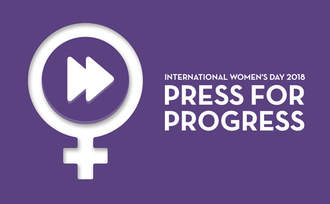
Again, it is not very promising for International Women’s Day, is it? Or is it? Jesus was in the midst of heavy controversy, having driven out a demon. Such a mighty act could be ignored, for it was having a powerful effect on ‘the crowd’. So those resistant to Jesus tried to reframe his actions as part of satanic actions, seeking deliberately to misinterpret and to discredit his motives and energies. Does that sound at all familiar, I wonder? How many women have suffered the same fate, as their efforts to heal and drive out disturbing and even demonic forces have been caricatured as something disturbing and radically different from what they are?
In recent times there has been something of a stirring of women across the world, highlighted in such actions as Women’s Marches, the #MeToo and #TimesUp campaigns which have sought to mobilise women, and men, against the continuing demons of violence and abuse faced by women, even in so called civilised spaces. As with Jesus, such attempts at exorcism are often met with bitter opposition, derision and misinformation. As with Jesus however, such actions are not going to go away in a hurry, for they challenge us to cope with such divisions and choose what is right, even when this seems uncomfortable.
International Women’s Day is an opportunity to strengthen solidarity among women across the globe, and with supportive men. Like the ministry of Jesus, if it becomes comfortable, it will have lost its point. After all, the international women’s day movement began before the first world war, initially in the USA, as a protest against inequality and for women to have a real say in changing their world for the better. It was taken forward by socialists, and then communists, as part of their vision and drive for a more just and peaceful world. Adopted by the United Nations in 1975, it is much more than a symbol. It seeks to mobilise and empower, especially the poorest women of our world.
This year’s theme is #PressforProgress and seeks urgency to reverse some negative trends as well as continuing inequality. For, as the World Economic Forum’s 2017 Global Gender Equality Report showed, the gender gap is widening in many places, and it is calculated that it will take 217 years to close at the current rate of progress. This year the United Nations also highlights the particular challenges faced by rural women, who make up one quarter of the world’s population and the majority of the 43% of women in the global agricultural labour force. Less than 20% of rural landholders are women, and whilst the global pay gap between men and women is 23%, in rural areas it can be as high as 40%. This, let us remember, is where many of the growing Christian churches of our world are based. As in our Gospel reading, there is therefore an almighty struggle to enable life-giving change.
What can be done? A major factor must be releasing women from today’s demons of economic, social and psycho-spiritual domination. Like Jesus, we need to side with the marginalised, so many of whom are women, especially the poorest of our world. For as the United Nations Secretary General, Antonio Guterres, has said: ‘Achieving gender equality and empowering women and girls is the unfinished business of our time, and the greatest human rights challenge in our world.’
Undoubtedly, having women in more prominent positions appears to make a big difference. The Global Gender Equality Report shows that the gender gap is closing in areas such as health and education where women are better represented, whereas progress in the workplace and politics is slow. Perhaps most significantly, where women are in leadership positions advances generally come much more easily. Women appear to hire more women and act as role models for others. All of this perhaps then brings us back to the representation of women alongside men in all aspects of our own Christian life. How well are we doing with this?
Once again, Christians are driven into handling conflict creatively. This is the continued story of the Church, much though we hate to admit it. For it is the Gospel story. One of the abiding reasons for a lack of progress and action, for women and other marginalised groups, is dislike of division and rocking the boat. For it isn’t always easy to take on demons of oppression or to live with conflict, even when actions are not portrayed as other than they are. Yet today’s Gospel story encourages is to hold fast in doing so, to stand up for what is right, and to make a difference, in solidarity with others. As Christians, we do so in the strength of God’s grace, the love of Christ, and the power of the Holy Spirit, Amen.
by Jo Inkpin, 8 March 2018
 RSS Feed
RSS Feed